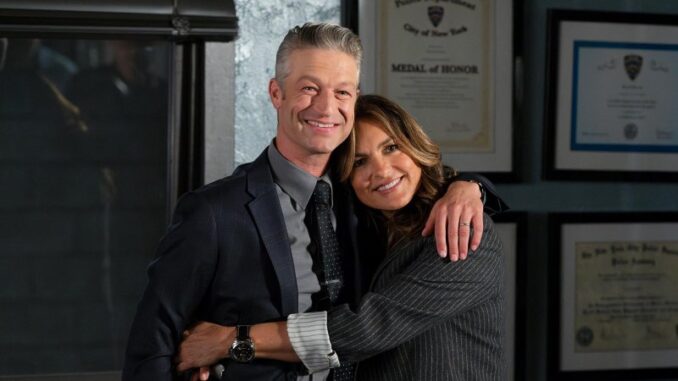
The Quiet Crusade: Peter Scanavino, Carisi, and Eleven Seasons of Justice’s Shifting Sands
In the grim, often unforgiving landscape of Law & Order: Special Victims Unit, where justice is a daily, bruising battle and darkness perpetually looms, certain characters become anchors. For over a decade, Peter Scanavino’s Sonny Carisi has evolved from a somewhat awkward, well-meaning detective into the steadfast, morally grounded Assistant District Attorney, anchoring the legal side of the show’s relentless pursuit of justice. When Scanavino speaks about Carisi, the courtrooms, and his eleven seasons embedded in this universe, he offers not just actorly insights, but a profound reflection on the show’s enduring relevance and the ever-shifting definition of “justice.”
Scanavino’s initial introduction as Detective Dominick Carisi Jr. felt like an intentional shake-up to the precinct’s dynamic. A Brooklyn-bred family man with a strong moral compass and an almost old-school earnestness, Carisi was initially perceived as an outsider, a bit too green for the seasoned investigators around him. Scanavino, however, imbued him with an understated intelligence and a deep empathy that slowly endeared him to both his colleagues and the audience. This foundation proved crucial when, after five seasons as a detective, Carisi made the pivotal leap to the District Attorney’s office. This pivot wasn’t merely a career change for the character; it was a narrative masterstroke that allowed SVU to delve deeper into the complexities of the legal system, extending the reach of its storytelling beyond the initial arrest. Scanavino’s observations on this shift likely highlight the challenge and reward of expanding Carisi’s canvas, moving him from the gritty streets to the hallowed, often frustrating, halls of justice.
The courtroom, as Scanavino now intimately knows, is a different kind of battlefield. No longer is Carisi chasing perps through dark alleys; he’s navigating legal loopholes, cross-examining emotionally fragile victims, and sparring with defense attorneys in an intellectual gladiatorial arena. This shift brought a crucial new dimension to both Carisi and the show. Scanavino’s portrayal underscores the immense pressure of securing a conviction while upholding the integrity of the law. He must balance Carisi’s inherent empathy for victims with the cold, hard facts required for a successful prosecution. We see him grappling with plea bargains that feel like compromises, and fighting for justice when the system itself seems designed to obfuscate it. Carisi, through Scanavino’s nuanced performance, becomes a voice for the often-silent victims within the legal apparatus, embodying the hope that even in a bureaucratic maze, someone is fighting fiercely for what is right. The actor’s immersion in this environment means understanding the weight of every objection, every piece of evidence, and the life-altering implications of every verdict.
Eleven seasons is a lifetime in television years, and Scanavino’s journey with Carisi has mirrored SVU’s own evolution in depicting “justice.” Initially, justice on the show often felt like a clear-cut mission: catch the villain, lock them away. But as the years have passed, and as Carisi moved into the DA’s office, the show has increasingly explored the more nuanced, sometimes agonizing, aspects of justice. It’s not just about conviction; it’s about healing, about systemic change, about giving survivors a voice, and occasionally, about recognizing the shades of gray in human culpability. Scanavino, living with this character for so long, has become a steward of this evolving definition. He’s seen Carisi mature from an eager investigator to a thoughtful prosecutor, someone who understands that justice can be slow, imperfect, and deeply personal. His steadfast presence provides a continuity, a moral compass that guides the audience through harrowing narratives, reminding us that even after a decade, the fight for justice remains profoundly relevant.
In speaking about Carisi, the courtrooms, and his eleven-season tenure, Peter Scanavino offers more than just a glimpse behind the scenes of a long-running procedural. He illuminates the very heart of Law & Order: SVU: its commitment to portraying not just the crimes, but the arduous, often Sisyphean, journey towards accountability and healing. Through Carisi, Scanavino embodies the quiet crusade within the justice system, a persistent hope that even when the scales seem tipped, an unwavering advocate can make all the difference. He reminds us that justice, particularly in the complex world of special victims, is not a destination, but a continuous, dedicated fight.
